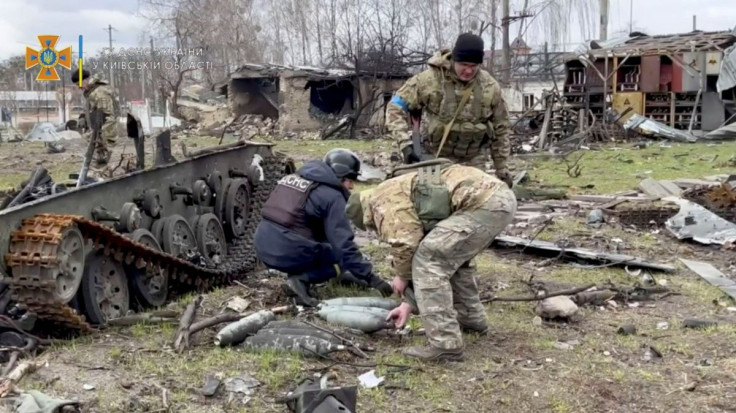Russian Forces Bombard Ukraine Cities As U.S. Sanctions Target Putin Family

Russian artillery bombarded Ukrainian cities on Wednesday, as Ukraine's president urged the West to act decisively in imposing new, tougher restrictions on trade with Russia in response to civilian killings widely condemned as war crimes.
The United States announced new sanctions, including on Russian President Vladimir Putin's daughters, days after the grim discovery of civilians shot dead at close range in the Ukrainian town of Bucha north of Kyiv when it was retaken from Russian forces.
Pope Francis, without apportioning blame, described the killings as a "massacre" and Ukrainian President Volodymyr Zelenskiy said the West needed to do more to rein in Russia.
"I can't tolerate any indecisiveness after everything that Russian troops have done," Zelenskiy told Irish lawmakers by videolink.
U.S. Treasury Secretary Janet Yellen said Russia's invasion and the Bucha atrocities represented "an unacceptable affront to the rules-based international order". U.S. President Joe Biden wanted Russia expelled from the Group of 20 major economies, she said.
Western policymakers have denounced the killings in Bucha as war crimes, and Ukrainian officials say a mass grave by a church there contained between 150 and 300 bodies. Satellite images taken weeks ago in Bucha show bodies of civilians on a street, a private U.S. company said.
Moscow denied targeting civilians there or elsewhere. Russia's foreign ministry said that images of bodies in Bucha were staged to justify more sanctions against Moscow and derail peace talks with Kyiv.
Russia refers to its Feb. 24 invasion as a "special military operation" designed to demilitarise and "denazify" Ukraine. Ukraine and Western governments reject that as a false pretext to invade a democratic country.
The war has killed thousands, turned entire cities into rubble and left a quarter of Ukraine's population homeless. As it heads into its seventh week, the risk that it could become a broader conflict remains a concern.
Reflecting such fears, the EU executive said it had begun a stockpiling operation to boost its defences against chemical, nuclear and biological threats.
BESIEGED CITY
A siege of the southern port of Mariupol continued on Wednesday, trapping tens of thousands of residents without food, water or power.
"The humanitarian situation in the city is worsening," British military intelligence said.
State-owned Ukrainian Railways said there were a number of casualties after three rockets hit a station in eastern Ukraine. It did not give a precise location.
Many in the eastern town of Derhachi, just north of Kharkiv and near the border with Russia, have decided to leave while they can. Buildings have been badly damaged by Russian artillery. Kharkiv itself has been hammered by air and rocket strikes from the start.
Mykola, a father of two in Derhachi who declined to give his surname, said he could hear the thud of bombardments every night, and had been hunkering down with his family in the corridor of their home.
"(We'll go) wherever there are no explosions, where the children won't have to hear them," he said, hugging his young son and struggling to hold back the tears.
Ukraine's military said Russian forces were continuing preparations for an eastern offensive in order to take full control of the Donetsk and Luhansk regions. It said the main focus of current hostilities was Donetsk, where Russian troops were still trying to seize all of Mariupol.
Ten high-rise buildings were on fire in the eastern town of Sievierodonetsk after Russian shelling on Wednesday, the region's governor said in an online post.
Hungarian Prime Minister Viktor Orban said he had spoken with Putin and asked him to announce an immediate ceasefire.
NEW SANCTIONS
The United States announced a new round of sanctions targeting Russian banks and Kremlin officials and banning Americans from investing in Russia.
The sanctions hit Russia's Sberbank, which holds one-third of Russia's total banking assets, and Alfabank, the country's fourth-largest financial institution, U.S. officials said. But energy transactions were exempted, the officials said.
The United States is also placing sanctions on Putin's two adult daughters, Russian Foreign Minister Sergei Lavrov's wife and daughter, and members of Russia's security council.
"I made clear that Russia would pay a severe and immediate price for its atrocities in Bucha," Biden said on Twitter.
Britain also froze Sberbank's assets, and said it would ban imports of Russian coal by the end of the year.
The head of the European Commission signalled further moves - including examining energy imports - on top of sanctions unveiled by the bloc on Tuesday.
But a crack in a unified EU front emerged, with Orban saying Hungary was prepared to accede to Russia's demand to pay in roubles for Russian gas.
Russia supplies around 40% of the EU's natural gas consumption. The EU also gets a third of its oil imports from Russia, about $700 million per day.
Moscow last week demanded payments for gas in roubles from countries it deemed "unfriendly", but Brussels said those with euro or dollar contracts should stick to them.
Germany, Europe's largest economy which relies on Russian gas for much of its energy needs, warned that while it supported ending Russian energy imports as soon as possible it could not do it overnight.
Russia edged closer to a potential default on its international debt as it paid dollar bondholders in roubles and said it would continue to do so as long as its foreign exchange reserves were blocked by sanctions.
© Copyright Thomson Reuters 2024. All rights reserved.





















